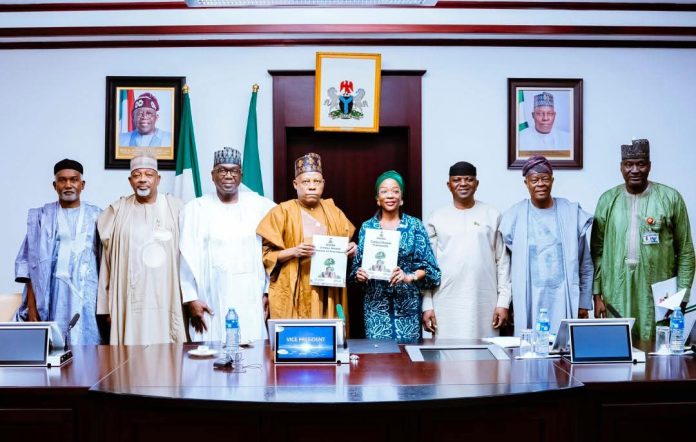Nigeria is taking decisive steps to enter the global carbon economy, with President Bola Tinubu approving the country’s National Carbon Market Framework, the activation of its Climate Change Fund, and the reinstatement of the National Council on Climate Change (NCCC) into the national budget. The approvals, delivered at a council meeting in Abuja and represented by Vice President Kashim Shettima, form Nigeria’s most assertive policy pivot yet to capture climate finance and participate fully in carbon trading systems that are reshaping global economics.
At the center of this shift is an ambitious projection: Nigeria aims to unlock $2.5 billion to $3 billion every year for the next decade through verified emissions reduction credits and clean-energy investments. For a country grappling with foreign exchange deficits, high unemployment, and infrastructure gaps, climate finance is no longer viewed as a supplementary environmental fund, it has become an economic strategy.
Nigeria’s move arrives ahead of the 2025 UN Climate Change Conference (COP30) in Belém, Brazil, where carbon markets are expected to dominate negotiations. As the world tightens emission limits and companies seek offsets to meet net-zero pledges, nations with significant mitigation potential stand to influence how value is created and traded. Nigeria sees itself as one of those nations, a major economy with vast renewable energy potential, large-scale agricultural land, and one of Africa’s largest forested wetlands in the Niger Delta.
The decisions approve not only policies on paper but systems for implementation. Restoring the NCCC budget line under annual federal allocations guarantees sustained institutional funding, ending a stop-start cycle that has historically slowed Nigeria’s climate governance. Operationalizing the Climate Change Fund equips national institutions to receive and channel resources more efficiently, a prerequisite for international investors and multilateral funds that demand transparency and clear disbursement pathways.
Read also: From dialogue to deals: Africa Climate Investment Summit 2025 paves way for scalable climate finance
Nigeria’s Director-General of the NCCC, Omotenioye Majekodunmi, outlined the significance of these reforms, emphasizing that Nigeria is now eligible to access new rounds of multilateral climate finance. Eligibility alone, however, is only the first step. Countries such as Kenya, Morocco, and South Africa have already demonstrated how carbon credit infrastructure can evolve into industrial shifts, from solar manufacturing to regenerative agriculture and methane-reduction technologies.
For Nigeria, the challenge will be to convert policy readiness into tangible decarbonization outcomes, particularly in heavy-emitting sectors such as power generation, cement, and oil and gas production.
Nigeria’s entry into carbon markets represents both urgency and opportunity. The nation faces mounting climate risks that directly affect livelihoods: estimated desertification swallowing up to 350,000 hectares annually in the north, rising sea levels threatening coastal megacities like Lagos, and extreme heat driving power grid failures and agricultural stress. Committing to carbon pricing and market-regulated mitigation could reduce national emissions while enabling investment that powers adaptation, irrigation systems, resilient crops, distributed renewables, and clean cooking solutions.
Read also: Ethiopia’s Coffee exports surge by 47% as reforms and new trade deals fuel record growth
Carbon market participation demands accurate monitoring, verifiable emissions baselines, and regulatory safeguards to ensure communities benefit rather than bear displacement risks. Local trust will be crucial in regions where oil extraction has historically promised prosperity but delivered pollution. To succeed, climate finance must translate into jobs in solar deployment, youth-led carbon project development, and innovation in green infrastructure, not merely exportable carbon credits.
Africa stands at a critical economic crossroads. While the continent contributes less than 4% of global emissions, it receives less than 5% of climate finance and remains vulnerable to supply-chain disruptions imposed by others’ decarbonization ambitions. Nigeria’s intention to “take its rightful place,” as Tinubu emphasized, signals a growing continental insistence on climate equity, that Africa deserves financial tools for development, not penalties for industrialization it never fully realized.
Read also: Angola seeks $4.5 billion to link its Atlantic Coast to Zambia’s Copperbelt
With COP30 approaching, Nigeria’s leadership aims to show that African countries can enter global carbon systems not as passive recipients of aid, but as market architects, negotiators, and beneficiaries. The effectiveness of this carbon market framework will ultimately be measured in two currencies: reduced emissions and improved quality of life for Nigerians. If both are delivered, Nigeria will not only shift its domestic climate trajectory but strengthen the economic case for Africa’s active stake in a low-carbon future.
Engage with us on LinkedIn: Africa Sustainability Matters






